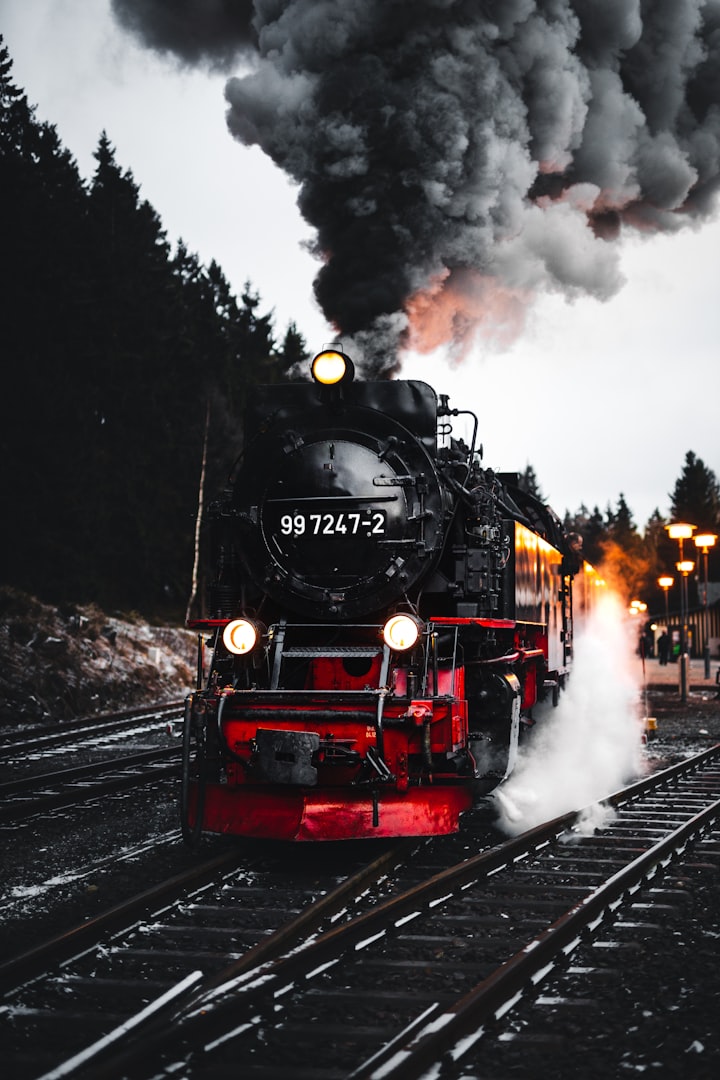
The countryside of Saskatchewan braced the train, racing by on both sides. He was not native to this province; this was his first taste of national travel without his parents. It should have been exciting and romantic, and it was, but it was also unnerving, and not because he was merely eighteen, able to enlist in the armed forces if he were so inclined, which should have made a fearless traveler out of him. The fearless travelers of this world usually had some clue as to how they had boarded a train in the first place... and when.
The unceasing klickety-klack of the wheels upon the railway lines, coupled with the occasional blasts of the train's horn, did little to soothe his nerves. He had traveled by rail before, with his family; he was even able to sleep on a moving locomotive. It was midmorning. He was not fatigued. He wiped a line of perspiration from his brow with one hand, noticed that his clothing, approved for travel, was dry.
Hadn't he kissed his parents and siblings good-bye? Someone, a great deal more attentive and wealthy than himself, must have paid for his ticket; was it while he wasn't looking? It was almost as if a slice had been cut, from the birthday cake of his mind — a thought so ridiculous that it made him smile, before a more disturbing thought presented itself to him: an attendant may approach him, hand outstretched to authenticate his ticket, and what could he say or do?
The youth did not have a ticket. How could he have boarded, without one?He had no idea, not even one clue, as to how he had come to be aboard this train. It was not the usual everyday sort of trouble he encountered in what, to date, had been a modest life, one bereft of high adventure, or mysteries. An added mystery sat, in the next rail car, radiating invisibly, without even an overt glance in his direction, enchanting him.
One glimpse of her bared knees (visible, between the rise of her socks and the edge of her skirt) 'pushed down the accelerator' on his pulse, as surely as if the engineer had poured on the steam, to push this train to its record velocity down its tracks. Her school uniform was immaculate — he did not mean a Catholic joke by that appraisal (it would not have occurred to him to make such a witticism). Yes, he wanted to imagine what more he could glimpse, if morality and modesty were no obstacles, but he had a pressing concern to address first that was bigger than some adolescent infatuation.
She wasn't from the past, that much he could tell, from where he sat down a short walking distance to the rear of the train. She might have been only sixteen, though not younger than that; he couldn't tell. She was not one of the pre-war relics, that made up the vast majority of the other passengers, outnumbering him, his fellow teen-agers, and the odd babes, held close in their parents' arms.
He was not opposed to making this voyage. It was his desire to travel east, from his home town in Alberta, to a prestigious school in Toronto that had accepted his parents' application and money. He just could not reconcile a gap in his recent memory, that would mask the process by which he found himself aboard this steely juggernaut so readily. It might have distracted a less-focused youth from the sight of this charismatic maiden, who seemed not to have noticed him.
A newfound hunger, joined with his desire to escape banishment from the train, drove him to infiltrate the next car, in search of the dining area. The (presumably) married couple who sat to her right co-read a copy of a large city's newspaper. As the young man attempted to walk carefully past them, he overheard the husband scoffing, "What's this big hurry, with getting the Americans to the moon? Didn't that Conrad fellow set a new world record?Flew around the globe in, what is it? Eight days? That beats Jule Verne, ten times over, already. Are you acquainted with his work, mademoiselle?"
The youth couldn't help but follow the question, with his darting gaze, to its intended target, the young woman. "Un véritable âge de miracles," was the untranslated, but understood, answer from her smiling lips. She was either a Frenchwoman, or a fille du Québec, but one thing was certain, she was an older woman, not a younger one; at least nineteen, he guessed. Hers was an almost blasé demeanor, not akin to his alerted, frantic energy: "We have no need for more than one miracle at a time."
She met his blue-eyed gaze, startling him. "President Kennedy will have to believe in them for me," she said, shrugging in a way that made the couple laugh. The youth headed into the next compartment, squirming, a mixture of interest and selfconsciousness filling him. Perhaps a meal would help —
^^^^
He had gleaned nothing new, in the way of an explanation for his presence on this vehicle, but he had learned a few things from it, and from her. The pair were Dacre — he preferred to answer to "Dack" — and Jacqueline, an appealing name made even more so by how she pronounced it: zhak-leen. This locomotive carried freight or passengers, depending upon its mission, for the Canadian General Railways line. They exchanged names, kept up a superficial conversation, as they moved toward the dining car.
Jac (she identified this, in her lovely Quebec accent, as being her preferred name) knew more than she was telling. He had guessed accurately that she was older than he was — she would, she divulged, turn twenty-one years of age in December. Her elfin face masked her experience and shrewdness, as her voice betrayed her wit: "So we are now Dack and Jac — don't you see?" she quipped, without more than a hint of amusement in her green eyes, as they infiltrated the dining compartment.
It was currently loaded with their fellow passengers and accoutred with the expected crewmembers. Dack did not know for certain, though he was in a process of discovering that certain otherwise capable employees, gathered in another compartment, discussed a matter of great concern to, but which they chose not to share with, the passengers — ostensibly for their benefit. Dack, who was taller, bent over to whisper into her ear, "What's wrong, do you think? Everyone's acting like something's going on." He pointed out a peculiar rigidity in how the other diners were seated, as if they had chosen to leave plenty of room for other persons to move past them; not what the hungry travelers he had known, on past trips, were wont to do.
She tapped his shoulder, a grim sort of smile signaling that something was worsening. He looked over his shoulder, just in time to flatten against the cabin door to his right, pressing against her, as four uniformed employees of the train hustled past them, urgent expressions on their faces; one, who was not much older than Dack, grimaced as though apprehensive. "They're afraid," Jac surmised, as if putting together clues. "They are, Dack. Come." She pulled on his upper arm. He found himself liking it. "We've got to get a word with the conductor."
Dack didn't like this idea, but he was hardly about to let the attractive, but peculiar, girl out of his sight now. They swayed with the train's motions as they moved forward, through compartments. Before they could penetrate, then pass through, the most-forward one, though, they came up short. The cluster of railway employees blocking their access to the forward car meant to impede their efforts was aware of something amiss, jusdging by the way they glared at the young couple. One uniformed attendant pointed beyond them and said, "You two will have to go back to your seats. In fact, it might be a good idea to tell the other passengers to return to their seats and wait for further instructions. We're having a bit of a day up here."
"We're just interested in trying to help," Dack said, but the attendant had already turned away. Jac alerted him to turn around; the married man in the rear compartment, the one who doubted Kennedy's goal of landing a man on the moon in nine years, now rushed forward, having loosened his tie and rolled up his sleeves. Train employees made room for him to enter the front compartment. Dack and Jac got a glimpse of a man he presumed to be the engineer, who was grimacing on the floor.
Passengers who hadn't gotten a bird's-eye view like he and his new friend had gotten, were nonetheless aware that something was amiss. One being the somewhat rumpled fellow, who looked to be in his late thirties or early forties, who stood at the forward end of the dining car and stabbed the air with an accusing index finger. "There's something wrong with this train, I reckon," he said. "They want to 'keep us calm', but when they don't tell us anything, they're asking for a lot when they ask us to do that."
The fellow's discourse took on a more shrill tenor. Two other men directed him to pipe down. Even Dack, who found the whole scene a regrettable, but excusable, case of jitters, wanted to muster up the 'right' words to quiet the passenger. He looked to Jac, whose repose belied how seriously she seemed to be working out the problem in her mind. Without looking at him, all she had to say, for the moment, was: "He's becoming a problem, I know, but he has a good point."
"We have to figure out what to do," he was shouting at her, a little over an hour later. They stood in the center of the swaying train, as its brakes were squealing, with a vain effort, to retard the locomotive's relentless progress. She held a stare, her green eyes boring into his blue ones, and nodded with a smile. She spun and started toward the front of the train. "There may not be much to this, but if we can figure it out — at least, I promise to keep you safe." If I can, he thought, but did not say.
Jac's smile was patience sugared with empathy, as if she were directing it at a small child who did not understand. "That's not what you're here to do. It matters, don't you see, what we do here, now?" Clutching him, by his coat's lapels, she drew him closer. Before anything scandalous could happen, they were jostled, none too gently, by the jittery passenger. Wild-eyed now, with a dialed-up intensity, he made no effort to apologize to the couple. "They're saying the engineer's down," he blazed. "We've going to crash if that doctor can't rescue the guy."
^^^^
The tone of their discussion did not improve, as their train had crossed into Manitoba. Dack tried to reason with the nervous man, who seemed rather a cheerful doomsayer; it was almost as he wanted the locomotive to wind up a wreck stacked with bleeding bodies. but Jac said no, that was nonsense. A few more minutes later, she wasn't so forgiving. The man Dack was calling "Mister Jitters" slapped his hands against the wall of the compartment, as the passengers in the next car gaped at his antics. Someone was definitely going to be hurt, and soon.
Mister Jitters attempted to run past Jac, almost knocking her right off of her feet, into Dack, who caught her by the shoulders. "We've got to stop," Jitters howled, and Dack wanted to punch him, or at the very least, give him a severe tongue-lashing. Jac's head snapped to one side, a look of inexplicable calm on her lovely features, and she planted her feet, and seemed to concentrate on something. Dack looked over to see why the babbling fool was no longer babbling, finding him conspicuous by his sudden absence from the compartment.
Dack searched the car, without a result. He followed Jac's gaze, to the window. Mister Jitters was glaring up at them, just beyond the glass. Clarifying: he glared up at them from outside of the train, staggering awkwardly as he fell behind the racing locomotive, on the terrain just beyond the railway lines. Couldn't be. Dack blinked. It was. He looked about for something real, and found only Jac's steady gaze. "Had to be done. Ce train doit rouler," she said, more bored than astonished.
"'This train must roll', that's all you have to say about... that?" he gasped. "Jac, he was here, and then, he was... out there." He almost tripped, as he stepped back from her embrace. An even more preposterous notion rose: "Jac, I know this will sound like I've got about a jam buster for brains, but did you, well have —" he deepened his voice consciously — "something to do with that?"
Jac chuckled at his effort to sound more commanding. "Something? Oui. In fact, I was thinking of doing it for, well, them." His blank expression was an invitation to expand that she almost disregarded. "I was mistaken before in that we may need more than one miracle. I am going to need many of them. We must get them off of the train, too."
"Them, who?" Dack could only burst out, as he tried to make sense of what he had just seen and heard. She stopped and looked at several of the other passengers, as if studying their faces. "No, you mean...? You can't be... Jac, you're saying, you want to... do what you just... with all of them? All of us?"
She slapped her hands together, then hugged herself, as if cold, although it was not a winter's day. "No, I don't think I can," she said. A forelock of her brown hair fell in front of one eye. It was painfully attractive to see. "There are just so many," she said, almost in a confessional tone of voice, as if this embarrassed her to admit. "I tire when I do... I would be on the floor before I got everyone out of here. We must hope that the crew can stop this train."
Dack threw up his hands in mock expectation. "Oh, why stop there?" he let fly. "Think big, girl. Let's stop the whole world." She glared at him, as if he had uttered something foolish, because nothing up to this point had been a strain on anyone's power of credulity. He rubbed his eyes and grinned. "Or, if we really want to be carried off by men in white coats, we could hop into a time machine and warn them about the engineer's heart. Say, yesterday."
He wanted to laugh, but there was something blocking his mouth, and that was her own. Lips and tongues and teeth, hands mussing groomed hair, it was a very grown-up and messy spectacle they must have been making, if he stopped to think about it, which he did not wish to do. Then she broke off the kiss and said to him, "The world gives us what we need. We know now why you were sent here... to help me choose." Then, memorizing his features, she whispered, "I look forward to meeting you again, Dacre. Le trajet se termine ici!" She stamped her feet, and concentrated...
He was awake. He rolled over in his bed, in his home, in Alberta, and it was dawn. He bounded for his closet, collected his bathrobe and sped to the bathroom. A quick shower, a breakfast enjoyed with his parents and his siblings, quick pet of the dog's neck, and they headed out to the car. A short drive to the train station, where he purchased his tickets. Kisses to everyone, and he walked to the platform to await the locomotive. Dack rehearsed what he wanted to say to Jac, when he met her again for the first time. He wasn't sure he wasn't still asleep, and he didn't know yet whether they would have better luck, with their first attempt.
© Eric Wolf 2022.
About the Creator
Eric Wolf
Ink-slinger. Photo-grapher. Earth-ling. These are Stories of the Fantastic and the Mundane. Space, time, superheroes and shapeshifters. 'Wolf' thumbnail: https://unsplash.com/@marcojodoin.
Reader insights
Nice work
Very well written. Keep up the good work!
Top insight
Excellent storytelling
Original narrative & well developed characters






Comments (1)
This was a light-hearted and engaging read.